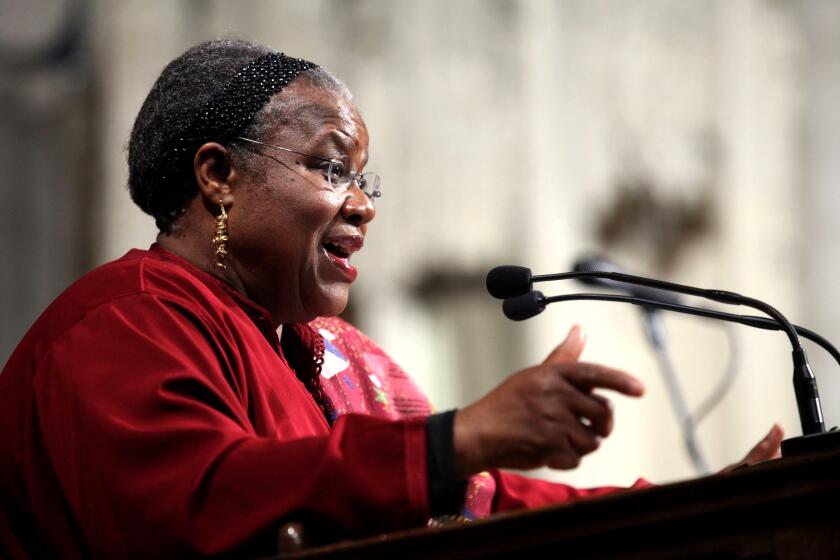Standing Tall With the Giants of Mambo
Keyboardist-bandleader Eddie Palmieri’s first album with timbale maestro Tito Puente was also the mambo king’s last recording before his death in June.
“It’s all history now,” says Palmieri with a sigh in a phone call from New York. He spoke of their collaboration on “Obra Maestra” (The Masterpiece), released in July, and Puente’s influence on Latin jazz.
“Tito was a true pioneer and a spokesman for the music. Not only was he a unique individual as an orchestra leader, musician, arranger and composer, he was the most exciting transmitter of the music ever seen.”
Puente changed the position of the rhythm section, putting it out in front of his orchestra, and that changed Latin jazz forever, Palmieri said.
“What he did there on timbales and vibraphone in front of the band made him the Latin jazz ambassador to the world. The song on the new album that I wrote the lyrics for, ‘El Puente Mundial,’ ‘The Bridge to the World,’ that was Tito’s place in the music.”
Palmieri, who brings his Latin jazz octet to Founders Hall in the Orange County Performing Arts Center on Friday and Saturday, notes that he and his older brother, the late keyboardist Charlie Palmieri, were attached to Puente at different ends of the timbalero’s musical life.
“The Palmieri brothers were the bookends of Tito’s career,” said the pianist. “Charlie was one of Tito’s first keyboardists some 50 years earlier. After he left the band, they stayed close all their lives. Tito was very important to me, but Charlie was my complete inspiration.”
One of Palmieri’s first major breaks came with Puente’s early rival, the bandleader-singer-timbale player Tito Rodriguez. Rodriguez, Puente and bandleader Machito were the stars of the mambo craze that swept New York City in the ‘50s.
When he began leading his first bands, Palmieri broke from the traditional conjunto lineup of vocalist, flute and violins and put a trumpet in the front line. Later, after meeting trombonist Barry Rogers in 1961, the keyboardist developed a revolutionary front line of two trombones and flute, a sound his brother dubbed “trombanga.”
“Barry Rogers was my best bandstand buddy,” Palmieri says of his late colleague. “When we brought (trombonist) Jose Rodrigues from Brazil into the band, it made for the most unique sound and musical exchange.
“Nobody had used trombones like that, coming out of the complex rhythmic format of Latin music. [Rogers and Rodrigues] had extraordinary range and they didn’t just solo but played constantly, which isn’t easy to do. One of the band members said, ‘You make those trombonists play so much they’re going to die right there on the bandstand.’ ”
Over the years, Palmieri wove various Latin, African and pop influences into his sound. His 1969 album “Justica” made a strong civil rights statement. His early ‘70s band, Harlem River Drive, fused the R&B; sounds of the day with his Latin roots.
A self-described “frustrated percussionist” who was influenced by jazz pianists Thelonious Monk, Bill Evans and McCoy Tyner, Palmieri plays with an aggressive rhythmic style that has all the athletic grace and hard-hitting excitement of a championship boxing match.
Despite the various orchestration and style formulas he’s tried over the years, his music is firmly grounded. “The Cuban structure, that style of music that came before 1960, that is my fundamental. No matter how I structure my music, that’s what it always leads to,” he said.
Not a Fan of New Latin Grammys
Palmieri has been awarded five Grammys and 11 nominations, including the first Grammy for a Latin album, for the 1974 release “Sun of Latin Music.” But Palmieri is not a fan of the Latin Grammy Awards, the first of which were held in September. He believes they should be abolished.
“The Latin awards have just turned into something about private parties and specific artists. I’m sure it was started with good intentions, but with the different artists and genres that were excluded, it’s turned out to be disappointing and even a moral tragedy.
“It’s like the Bill Cosby routine about the second egg. You pay 65 cents for the first egg, but you get two eggs for 75 cents. You have to wonder, what’s wrong with the second egg? They should have just extended the categories in the regular Grammys. Now people will always think, ‘What’s wrong with the second Grammy?’ ”
Just as Rodriguez, Puente and his brother served as his mentors, Palmieri has encouraged several jazz and Latin artists, including saxophonists Charlie Sepulveda and Donald Harrison, baritone saxophonist Ronnie Cuber, bassist Israel “Cachao” Lopez, trumpeter Victor Paz and singers, including Cynthia Ellis and Lalo Rodriguez.
His current band boasts a number of longtime associates, including trumpeter Brian Lynch, bassist Joe Santiago and conga player Richie Flores. The new kid on the block is 20-year-old Puerto Rican-born saxophonist Ivan Rentas.
Fittingly, Palmieri was introduced to Rentas by fellow saxophonist Mario Rivera at the “Obra Maestra” recording session, the first and last with his own mentor Puente.
BE THERE
Eddie Palmieri plays Founders Hall at the Orange County Performing Arts Center, 600 Town Center Drive, Costa Mesa; Friday and Saturday, at 7:30 and 9:30 p.m. $42-$46. (714) 556-2787.
More to Read
The biggest entertainment stories
Get our big stories about Hollywood, film, television, music, arts, culture and more right in your inbox as soon as they publish.
You may occasionally receive promotional content from the Los Angeles Times.






